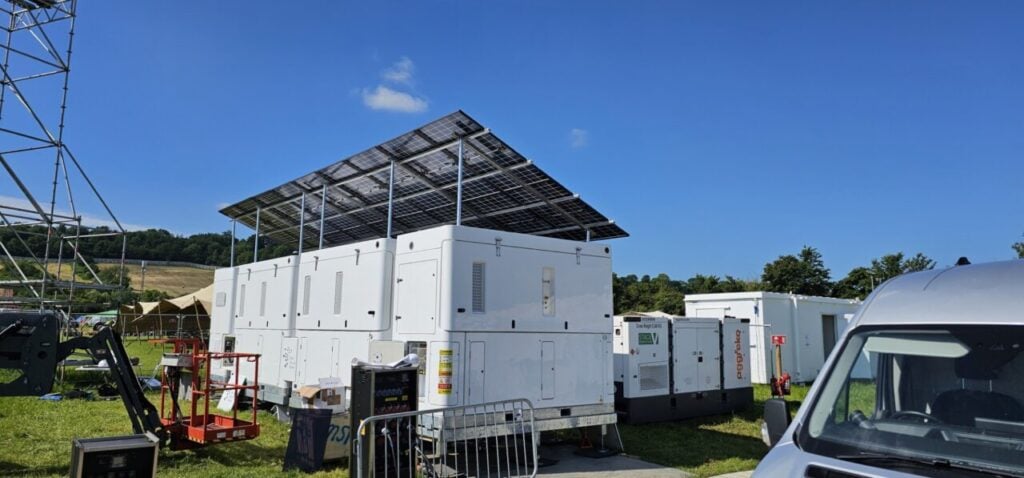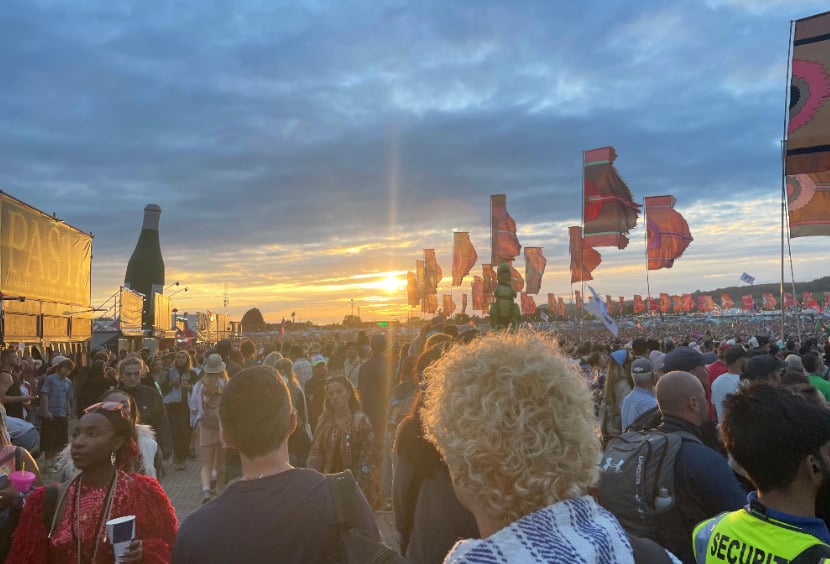Much of that power comes from generators running on HVO biofuels but many are integrated with battery storage units as backup, according to Progen Power, while a megawatt-scale solution powered one of the festival’s most well-known spectacles.
MSP Technologies: 1MW/3MWh BESS for Arcadia stage
MSP (Multi Source Power) Technologies provided a pre-charged battery energy storage system (BESS) to utility Ecotricity to power the Arcadia stage, which featured DJ sets from Fatboy Slim, Hot Chip and Eric Prydz from inside the head of a giant metal dragonfly structure, pictured above.
“(Ecotricity CEO) Dale Vince was convinced he could help to decarbonise the festival environment so commissioned us to construct the BESS, specifically for festival or portable power needs. The stage and BESS are a phenomenal achievement,” MSP CEO Simon Patterson told Energy-Storage.news.
The 1MW/3MWh BESS covered the load during the three days of performances as well as the five pre-show days with the help of HVO biofuels and a solar array for charging. It comprised six blocks with lithium iron phosphate (LFP) battery cells from Hithium and power conversion systems (PCS) from EPC Power.
During the show loads jumped from below 250kW to over 720kW, sometimes in the course of 20 milliseconds, something that Patterson said generators would struggle with.
“The power quality compared to a generator is chalk and cheese. If you tried those loads steps with a generator you’d see them coughing black smoke. The deviation in frequency was never more than 100th of a hertz and never more than 1.8V,” he said.
“The carbon reductions from using the BESS were massive but the biggest thing was just the quietness on site, outside of show hours. The ground team were really excited about having the BESS there as they are trying to be as eco-friendly as possible.”
The BESS is doing more festivals this summer, including Womad and a Massive Attack show, and MSP has aspirations to do many more next year alongside Glastonbury, Patterson added.

Allye: portable BESS units
Startup Allye provided its portable BESS units in partnership with partner Jaguar Land Rover (JLR). Some 25 of JLR’s Defender hybrid EV Range Rovers were used at the site and Allye’s BESS helped keep them charged. Allye’s units use second life EV batteries and have a storage capacity of 270kWh per unit.
Speaking to Energy-Storage.news, Jonathan Carrier, cofounder and CEO of Allye said: “Allye is delighted to see the MAX deployed at Glastonbury by JLR, to support charging of its vehicles. It demonstrates the flexibility of the system across a range of applications for JLR, from events to prototype testing.”
“The MAX is a highly versatile energy storage system that Glastonbury could use for sustainable power for the music festival itself. Imagine Shania Twain or Coldplay powered entirely by clean, off grid, energy! We encourage all events and festivals that require remote power to get in touch with Allye and make festivals truly sustainable.”
Other BESS: Coldplay’s own unit and other smaller BESS
Coldplay headlined Glastonbury on Saturday and the band has its own 1.5MWh BESS unit it uses while on tour. Unveiled a few years ago, the BESS uses 40 batteries including re-used EV batteries from BMW’s i3 range.
“We’re proud to partner with BMW to create the world’s first tourable, rechargeable show battery – which will allow us to power our concerts almost entirely from clean, renewable energy”, said Coldplay’s lead singer Chris Martin back in 2021.
Other smaller BESS were used on site but most were as backup to generators rather than the other way around, Patterson said.


